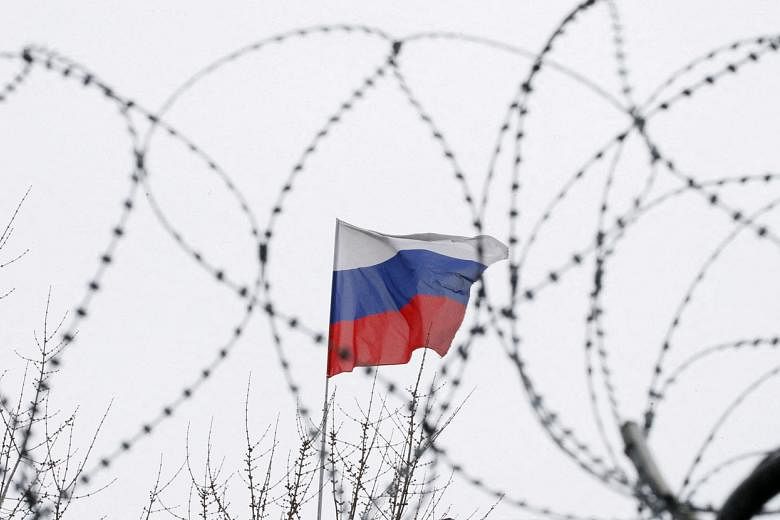LOS ANGELES (BLOOMBERG) - Russia's invasion of Ukraine last week brought global condemnation, trade restrictions and financial penalties. Now, the nation of 145 million is losing many of the world's most iconic brands.
Apple and Nike both announced plans on Tuesday (March 1) to halt product sales in Russia, cutting off the country to the most valuable technology company and the biggest maker of athletic wear.
That followed Hollywood studios such as Walt Disney and WarnerMedia pausing releases of new films in the nation - including The Batman, which is hitting American theatres this weekend and expected to become one of the highest-grossing movies of the year.
Taken together, the moves reflect a cultural and commercial split unseen since the Cold War ended in the late 1980s. From the iPhone to Air Jordans, highly prized US brands are vanishing from the Russian marketplace in a way that will be hard for consumers to ignore.
In Apple's case, the move follows a recent expansion in Russia. The company had registered a business office there in the past few months and posted job listings for about half a dozen positions in Moscow.
But President Vladimir Putin's aggression in Ukraine brought a quick policy shift. In addition to ceasing product sales in the country, Apple is removing the RT News and Sputnik News applications from App Stores outside Russia.
"We are deeply concerned about the Russian invasion of Ukraine," Apple said on Tuesday. "We are supporting humanitarian efforts, providing aid for the unfolding refugee crisis, and doing all we can to support our teams in the region."
Around the same time, Nike said it would be cutting off Russia as well, though it blamed logistics. The athletic wear giant said it "cannot guarantee delivery of goods to customers in Russia".
Nike did not immediately respond to a request for comment.
Beyond concerns about the invasion, operating in Russia has become very challenging for outside companies. With sanctions mounting, the rouble plunging and the United States banning transactions with the Russian central bank, deciding to pull out of the country has become an easier choice.
Exxon Mobil said on Tuesday said that it would end its involvement in a large oil and natural gas project in Russia, becoming the latest Western oil company to announce that it is leaving the country after Russia invaded Ukraine.
And it is not just US brands leaving. BP said this week that it would exit its 20 per cent stake in Russia-controlled Rosneft, a move that could result in a US$25 billion (S$34 billion) write-off and cut its global oil and gas production by a third. Shell followed suit, citing Russia's "senseless act of military aggression".
DaimlerTruck Holding, one of the world's largest commercial vehicle manufacturers, is also halting its business activities in the country.
But losing Apple was seen as a particular blow for Russia. When Ukraine Vice-Prime Minister Mykhailo Fedorov urged the company to stop sales in the country, he said it could turn Russia's young people against the war. He also called on Apple to shutter its local App Store - a step the company has not yet taken.
Apple has operated an online store specific to Russia for the last several years, as well as an App Store tailored to the country. HP, the largest supplier of personal computers to Russia, also stopped exports to the country this week.
Ford Motor joined the pullout as well, saying on Tuesday that it was "deeply concerned about the invasion".
The war itself may be entering a new phase. Early signs suggest that Russian commanders are preparing to redouble attacks against Ukraine's capital, Kyiv, after initial lightning strikes failed to make headway.
Apple said it will continue to evaluate the situation and that the company is in communication with governments on the actions that it is taking.
"We join all those around the world who are calling for peace," the company said.
Follow The Straits Times' live coverage on the Ukraine crisis here.

